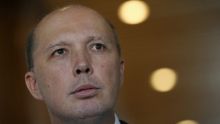In 2015 Cory Bernardi and his wife bought a $1 million commercial property in Kent Town, Adelaide. The building now serves as the headquarters for Bernardi's Australian Conservatives party.
But curiously, you won't find any mention of the building on the now independent senator's parliamentary pecuniary interests register. Under the real estate section of his register he lists only a residential property in Canberra.
More National News Videos
Perusing pollies' perks
Politicians are meant to declare their interests, but Adam Gartrell argues the system is only semi-transparent and lacks oversight.
What you will find elsewhere on his register is a shareholding in a company called Twenty-Eight KW. Bernardi set up this company in 2015 and then used it to buy the Kent Town building soon after.
Bernardi believes he has fully complied with the parliamentary disclosure rules.
"The building is owned by a company. I have declared shares in the company. It's not rocket science," Bernardi said.
Under the rules, MPs are required to declare shareholdings in public and private companies and real estate assets, including the location of the property and the purpose for which it is being used. This includes any shareholdings or property owned by the parliamentarian's spouse.
Anyone who doesn't properly declare their interests risks being found in "serious contempt" of Parliament - just like Michaelia Cash when Fairfax Media revealed this week she failed to declare a mortgage on a $1.4 million investment home.
Bernardi says the property is explicitly disclosed on a separate form detailing his wife's interests, which is not available to the public.

Fairfax Media in not alleging any wrongdoing on Bernardi's part but this example shows clear deficiencies in the rules.
Using this approach, an MP could set up a company and use it to buy dozens of properties and never be required to disclose the details. Or they could set up a trust to buy shares in all manner of companies and never tell taxpayers about it. Or they could hide their liabilities, which could include major debts, behind opaque credit lines.

Other politicians show blatant contempt for the rules.
Queensland independent Bob Katter point-blank refuses to detail his wife's interests even though the rules require it.

"She does not provide me with this information - regards this as private news," the maverick MP says on his register.
Elsewhere he says he "assumes" his wife has loans out because she has "at times bought and sold investment properties". But no details.
A news report five years ago said Katter had $700,000 in undeclared property assets under his wife's name. But he's got wriggle-room here because the rules stipulate you only have to declare everything of which you are "aware". At the time he was reportedly living in a house owned by his wife, which he had not declared.
Katter is thumbing his nose at the rules because as every politician in Canberra knows, the rules are a toothless joke.
He's not the only MP to take this cavalier approach to a spouse's interests. New Liberal MP Jason Falinski, in just about every field on his register, says he hasn't asked his solicitor wife Nichola Constant about her holdings.
Across the board, spousal incomes are rarely declared. Everyone takes a different approach to mortgages and liabilities. Some list credit cards, most don't. Very few list cars, even though the rules require all assets valued at more than $7500 to be listed. Many regularly update their register to declare gifts, like free tickets to the footy or the opera - but others seldom make changes after their initial declaration.
Across the board, there are glaring gaps and inconsistencies, and a startling lack of detail. Some disclosures are typed, others scrawled in illegible handwriting. Buried on the Parliament House website, the documents are not searchable by keyword. And when updates do occur, reporters typically only learn about it from a Twitter-bot set up by Guardian journalist Nick Evershed. Without that, most would go through to the keeper.
And what happens when a journalist - or a political enemy - catches someone breaking the rules? Some embarrassing news coverage, maybe a slap on the wrist, and that's about it. No one is ever actually held to account.
For most MPs, like Cash, there's no suggestion they've tried to do anything dodgy - they've just been careless. But taxpayers deserve the highest of disclosure standards so we can make up our own minds.
The Turnbull government is finally moving to clean up MP's entitlements. It's also slowly beginning to move on the woeful political donations system - and Labor is proposing to go much further in that realm.
The pecuniary interests system should be next.
Declare independence? A list of recent failures
- 2010 Tony Abbott Failed to declare a $700,000 mortgage for two years. Apologised
- 2013 Arthur Sinodinos Failed to declare directorships of six companies. Apologised
- 2016 Stuart Robert Had an undeclared financial stake, through a trustee, in a company run by major Liberal Party donor Paul Marks. Lost his frontbench job
- 2016 Andrew Hastie Failed to declare $870,000 house ahead of the election campaign. Apologised
- 2016 David Feeney Failed to declare he owned a $2.3 million house in Melbourne. Apologised
- 2016 Bob Day Accused of having an indirect pecuniary interest in the Commonwealth due to a complex arrangement around his electorate office. Day has since resigned from the Senate, the case is before the High Court
- 2016 Nick Xenophon Failed to declare a directorship of a company run by his father. Apologised
- 2017 Michaelia Cash Failed to declare a mortgage on a $1.4 million investment property. Apologised


















196 comments
Comment are now closed